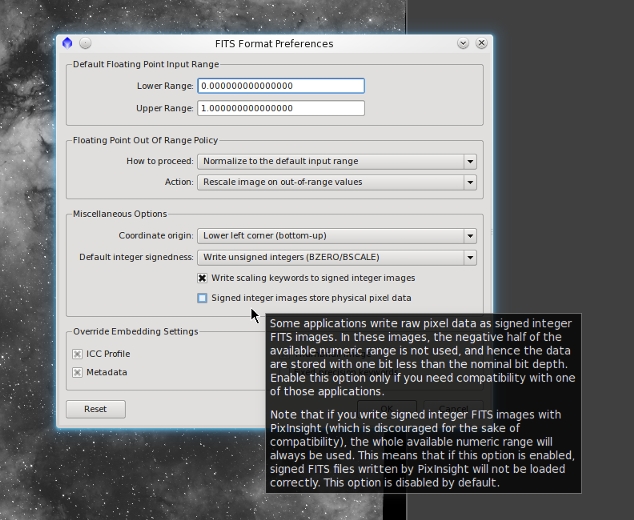The FITS Format Preferences dialog provides a new configuration option: Signed integer images store physical pixel data. This option is necessary to provide compatibility with some applications that store raw pixel data as signed integer FITS images. In such images, the negative half of the available numeric range (for example, from -32768 to -1 in 16-bit signed images) is not used. This decrements by one bit the effective numeric range of these images (for example, from 16 to 15 bits per sample).

Although these files are strictly valid as per the FITS standard, in our opinion storing raw pixel data as signed integer numbers is conceptually incorrect and creates compatibility problems between applications unnecessarily.
Please note that enabling this option breaks compatibility with signed integer FITS images written by PixInsight. This is because PixInsight always uses the whole available numeric range to store pixel data (for example, from -32768 to +32767 in a 16-bit signed integer image), since PixInsight stores and manipulates unsigned integer data internally. For this reason, you should enable this option only when you have to load problematic signed FITS files, and disable it as soon as you've finished working with them. For the sake of compatibility, our advice is to avoid the use of signed integer images completely: always write unsigned integer images with PixInsight.

Although these files are strictly valid as per the FITS standard, in our opinion storing raw pixel data as signed integer numbers is conceptually incorrect and creates compatibility problems between applications unnecessarily.
Please note that enabling this option breaks compatibility with signed integer FITS images written by PixInsight. This is because PixInsight always uses the whole available numeric range to store pixel data (for example, from -32768 to +32767 in a 16-bit signed integer image), since PixInsight stores and manipulates unsigned integer data internally. For this reason, you should enable this option only when you have to load problematic signed FITS files, and disable it as soon as you've finished working with them. For the sake of compatibility, our advice is to avoid the use of signed integer images completely: always write unsigned integer images with PixInsight.
